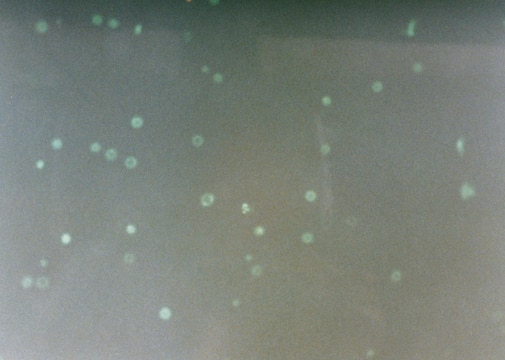C5740
Cytochrome P450 human
2E1 isozyme microsomes, with P450 Reductase and cytochrome b5, recombinant, expressed in baculovirus infected insect cells (BTI-TN-5B1-4)
Sign Into View Organizational & Contract Pricing
All Photos(1)
About This Item
MDL number:
UNSPSC Code:
12352202
NACRES:
NA.61
Recommended Products
biological source
human
Quality Level
recombinant
expressed in baculovirus infected insect cells (BTI-TN-5B1-4)
description
1.0 nmole P450 2E1 per 0.5 ml vial
form
buffered aqueous solution (100 mM potassium phosphate, pH 7.4)
UniProt accession no.
application(s)
cell analysis
shipped in
dry ice
storage temp.
−70°C
Gene Information
human ... CYP2E1(1571)
Looking for similar products? Visit Product Comparison Guide
Application
Cytochrome P450 is a heterogeneous family of isozymes whose primary function is to oxidize small molecules both as a function of intermediary metabolism (e.g., fatty acids) and to detoxify exogenous compounds (drugs or toxins). Alterations in the renal formation of Cytochrome P450 metabolites from arachidonic acid may participate in the formation of hypertension. Therefore, they have been identified as candidate mediators in the development of this multifactorial disease.
Biochem/physiol Actions
Cytochrome P450 is a heterogeneous family of isozymes whose primary function is to oxidize small molecules, both as a function of intermediary metabolism (e.g., fatty acids) and to detoxify exogenous compounds (drugs or toxins). Some isoforms have narrow substrate specificity, while others are promiscuous. The CYP1A1 isoform catalyzes 7-deethylation of ethoxyresorufin. Cytochrome P450 (CYP) plays an important role in detoxifying xenobiotics, cellular metabolism and homeostasis. One of the main mechanisms of drug-drug interactions is the induction or inhibition of these enzymes. CYP enzymes are transcriptionally activated by a variety of xenobiotics and by endogenous substrates via receptor-dependent pathways. Inhibition of these enzymes is a major factor in metabolism-based drug-drug interactions, and many chemotherapeutic medications can cause drug interactions by either inhibiting or inducing the cytochrome p450 enzyme system.
Analysis Note
Cytochrome c Reductase, b5, P450 content and p-Nitrophenol Hydroxylase activity reported on a lot-specific basis.
Storage Class Code
10 - Combustible liquids
WGK
WGK 1
Flash Point(F)
Not applicable
Flash Point(C)
Not applicable
Personal Protective Equipment
dust mask type N95 (US), Eyeshields, Gloves
Choose from one of the most recent versions:
Already Own This Product?
Find documentation for the products that you have recently purchased in the Document Library.
Mong-Heng Wang et al.
Hypertension (Dallas, Tex. : 1979), 42(4), 594-599 (2003-08-27)
The incidence of essential hypertension increases with obesity; however, the mechanisms that link obesity with hypertension are unclear. Renal cytochrome P450 (CYP)-derived eicosanoids--hydroxyeicosatetraenoic acids (HETEs), epoxyeicosatrienoic acids (EETs), and dihydroxyeicosatrienoic acids (DHETs)--have been shown to play an important role in
Xiangrong Zhang et al.
PloS one, 9(4), e94962-e94962 (2014-04-17)
The present study characterized in vitro metabolites of 20(R)-25-methoxyl-dammarane-3β, 12β, 20-triol (20(R)-25-OCH3-PPD) in mouse, rat, dog, monkey and human liver microsomes. 20(R)-25-OCH3-PPD was incubated with liver microsomes in the presence of NADPH. The reaction mixtures and the metabolites were identified
Mirza Bojić et al.
Drug metabolism and disposition: the biological fate of chemicals, 42(9), 1438-1446 (2014-07-06)
Cilengitide is a stable cyclic pentapeptide containing an Arg-Gly-Asp motif responsible for selective binding to αVβ3 and αVβ5 integrins. The candidate drug showed unexpected inhibition of cytochrome P450 (P450) 3A4 at high concentrations, that is, a 15-mM concentration caused attenuation
Dongju Lin et al.
Drug metabolism and disposition: the biological fate of chemicals, 42(10), 1727-1736 (2014-07-16)
Diosbulbin B (DIOB), a furan-containing diterpenoid lactone, is the most abundant component of Dioscorea bulbifera L. (DB), a traditional Chinese medicine herb. Administration of purified DIOB or DB extracts has been reported to cause liver injury in animals. The mechanisms
Our team of scientists has experience in all areas of research including Life Science, Material Science, Chemical Synthesis, Chromatography, Analytical and many others.
Contact Technical Service








